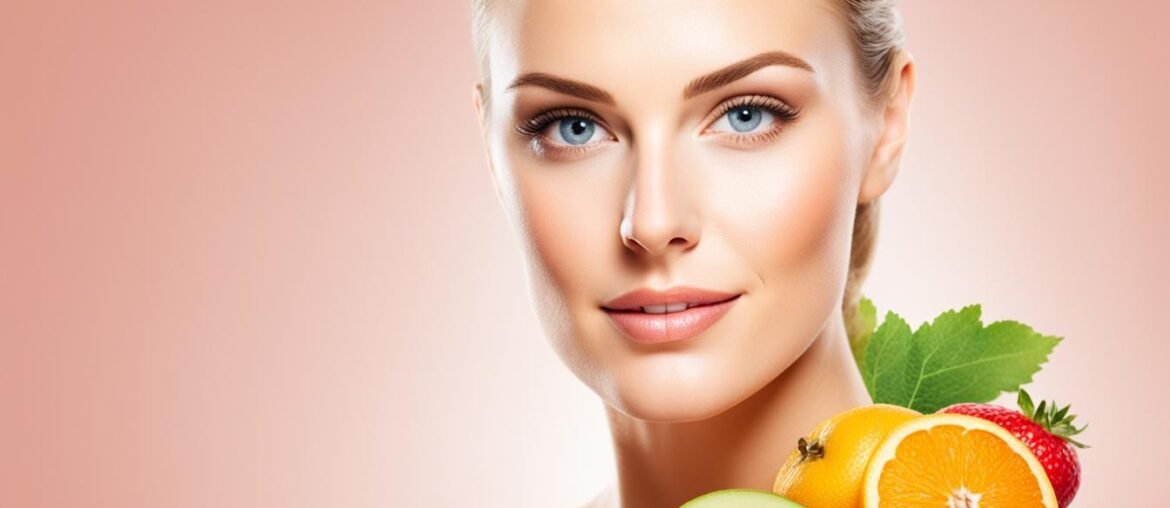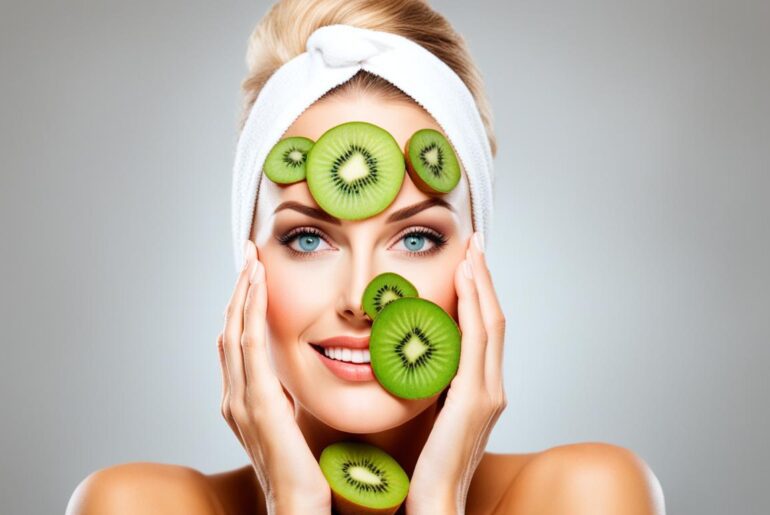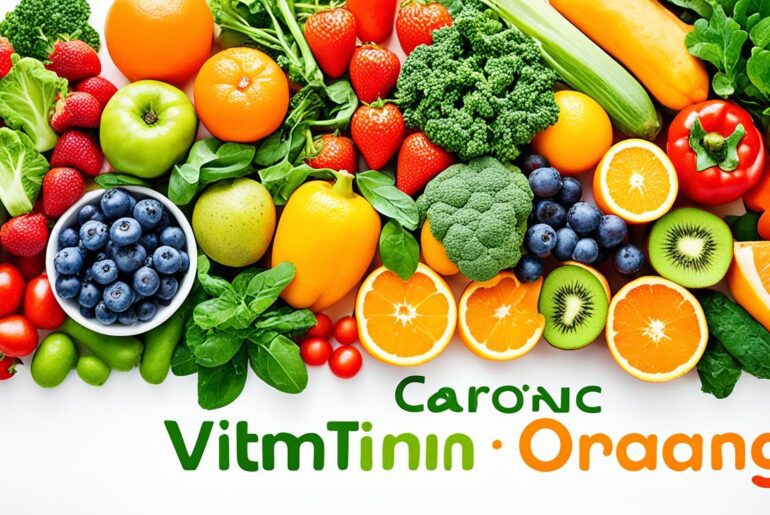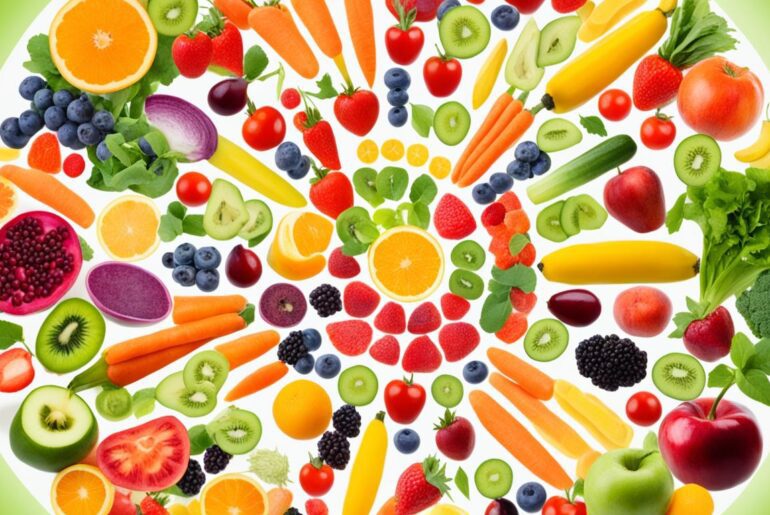As we age, we all want to maintain a youthful appearance and reduce the signs of skin aging. With the abundance of skincare products and supplements on the market, it can be overwhelming to determine which ones actually work. Many face creams claim to contain effective vitamins that can erase fine lines, reduce wrinkles, and prevent skin damage. But do these vitamins truly live up to their promises?
Before you spend a fortune on exotic vitamins and expensive skincare products, it’s essential to separate fact from fiction. Do these anti-aging vitamins really deliver the desired results, or are they just a marketing gimmick? Are there certain vitamins that are more effective in combating skin aging than others?
Discover the truth about effective vitamins for skin aging and explore the science behind their claims. From antioxidants that protect and repair the skin to essential vitamins that promote overall skin health, this article will provide you with valuable insights into the vitamins that truly make a difference in maintaining youthful and radiant skin.
So, are your anti-aging vitamins really effective? Let’s unlock the secrets to youthful skin and find out.
Key Takeaways:
- Not all vitamins in skin creams are effective in preventing or reversing skin damage.
- Selenium, vitamin E, and vitamin C are the antioxidants proven to decrease sun damage to the skin.
- Vitamin C is the most common antioxidant found in the skin and is essential for repairing free radicals.
- Collagen supplementation improves skin elasticity and reduces wrinkles.
- Vitamin A and vitamin D play crucial roles in regulating skin health and preventing premature aging.
The Power of Antioxidants in Skin Aging
Antioxidants play a crucial role in maintaining skin health and combating the effects of aging. These powerful substances have the ability to neutralize free radicals, unstable molecules that can damage cells and contribute to the aging process.
By reducing the oxidative stress caused by free radicals, antioxidants help to prevent the breakdown of collagen and elastin, the proteins responsible for maintaining skin elasticity and firmness. This helps to reduce the appearance of wrinkles, fine lines, and other signs of aging.
“Antioxidants are like the superheroes of skincare. They protect our skin from harmful environmental factors and keep it looking youthful and radiant.”
Some of the most effective antioxidants for skin aging are selenium, vitamin E, and vitamin C.
| Antioxidant | Benefits | Sources |
|---|---|---|
| Selenium | Protects against sun damage | Seafood, nuts, garlic |
| Vitamin E | Reduces oxidative stress and improves skin texture | Vegetable oils, grains, nuts |
| Vitamin C | Boosts collagen production and brightens the skin | Citrus fruits, berries, leafy greens |
These antioxidants work together to protect the skin from damaging free radicals and promote a healthy, youthful complexion.
The Importance of Antioxidants for Skin Health
Regular use of antioxidants in skincare can have a multitude of benefits for overall skin health. By neutralizing free radicals and reducing oxidative stress, antioxidants help to:
- Prevent premature aging
- Reduce the appearance of wrinkles and fine lines
- Maintain skin elasticity and firmness
- Protect against sun damage
- Brighten the complexion
- Improve skin texture and tone
By incorporating antioxidant-rich products into your skincare routine and consuming a diet rich in fruits, vegetables, and other antioxidant sources, you can nurture your skin from the inside out and achieve a radiant, youthful glow.
Selenium: Protecting the Skin from Sun Damage
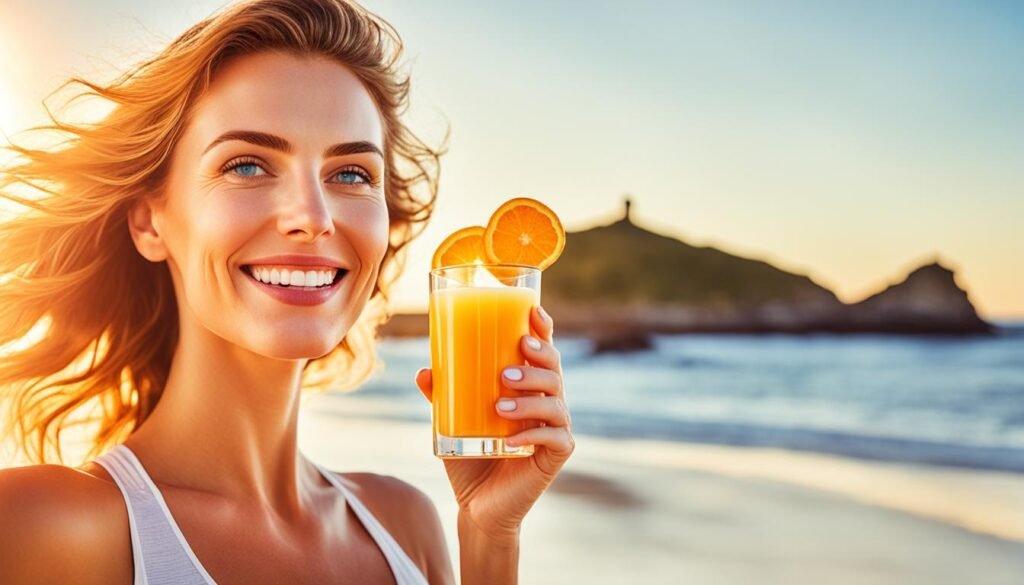
When it comes to safeguarding your skin against the damaging effects of the sun, there is one mineral that stands out: selenium. Not only does selenium protect the body from various cancers, including skin cancer caused by sun exposure, it also plays a key role in maintaining tissue elasticity and slowing down the aging process.
Selenium can be found in a variety of dietary sources, such as whole grain cereals, seafood, garlic, and eggs. By including these selenium-rich foods in your diet, you can help fortify your skin’s natural defenses against the harmful rays of the sun.
Studies conducted on animals have revealed that both oral consumption and topical application of selenium can provide protection against UV damage and delay the development of skin cancer. This mineral acts as a powerful antioxidant, neutralizing free radicals and reducing oxidative stress on the skin.
“Selenium acts as a shield, protecting the skin from the harmful effects of UV radiation and helping to prevent skin cancer.” – Dr. Emma Johnson, Dermatologist
By incorporating selenium into your skincare routine, whether through diet or supplements, you can enhance your skin’s resilience and promote a more youthful appearance. Alongside a comprehensive sun protection regimen, selenium offers another layer of defense against sun damage and the signs of aging.
| Selenium-Rich Foods | Selenium Content (mcg per 100g) |
|---|---|
| Brazil Nuts | 1917 |
| Tuna | 108 |
| Shrimp | 40 |
| Garlic | 14.2 |
| Eggs | 10.5 |
Source: National Institutes of Health (https://ods.od.nih.gov/factsheets/Selenium-Consumer/)
Vitamin E: Protecting Cell Membranes and Preventing Damage
Vitamin E is considered the most important antioxidant for skin health as it protects cell membranes and prevents damage to enzymes associated with them. This essential nutrient plays a vital role in maintaining the integrity of the skin’s protective barrier and promoting overall skin health.
There are several benefits of vitamin E for skin aging:
- Reduces sun damage: Vitamin E acts as a natural sunscreen, protecting the skin from harmful UV radiation and preventing sunburn. Its antioxidant properties help to neutralize free radicals generated by sun exposure.
- Promotes collagen production: Collagen is a protein that provides structure and elasticity to the skin. Vitamin E helps support collagen production, improving skin elasticity and reducing the appearance of wrinkles and fine lines.
- Improves skin texture: Vitamin E helps to moisturize the skin and improve its overall texture, leaving it smooth, soft, and supple.
You can incorporate vitamin E into your skincare routine through various methods:
- Consuming vitamin E-rich foods: Include foods such as almonds, spinach, avocados, sunflower seeds, and olive oil in your diet to increase your vitamin E intake. These foods are not only beneficial for your skin but also contribute to your overall health.
- Using vitamin E supplements: If you find it challenging to meet your vitamin E requirements through diet alone, you may consider taking vitamin E supplements. However, it’s important to consult with a healthcare professional before starting any new supplement regimen.
To maximize the benefits of vitamin E for skin aging, it’s crucial to combine its use with a comprehensive skincare routine that includes sunscreen, proper cleansing, and moisturizing. By protecting your skin from sun damage and nourishing it with vitamin E, you can achieve a healthier, more youthful complexion.
| Vitamin E-Rich Foods | Vitamin E Content (mg per 100g) |
|---|---|
| Almonds | 25.6 |
| Sunflower Seeds | 35.17 |
| Spinach | 2.03 |
| Avocado | 2.07 |
| Olive Oil | 14.35 |
Vitamin C: Repairing and Protecting the Skin
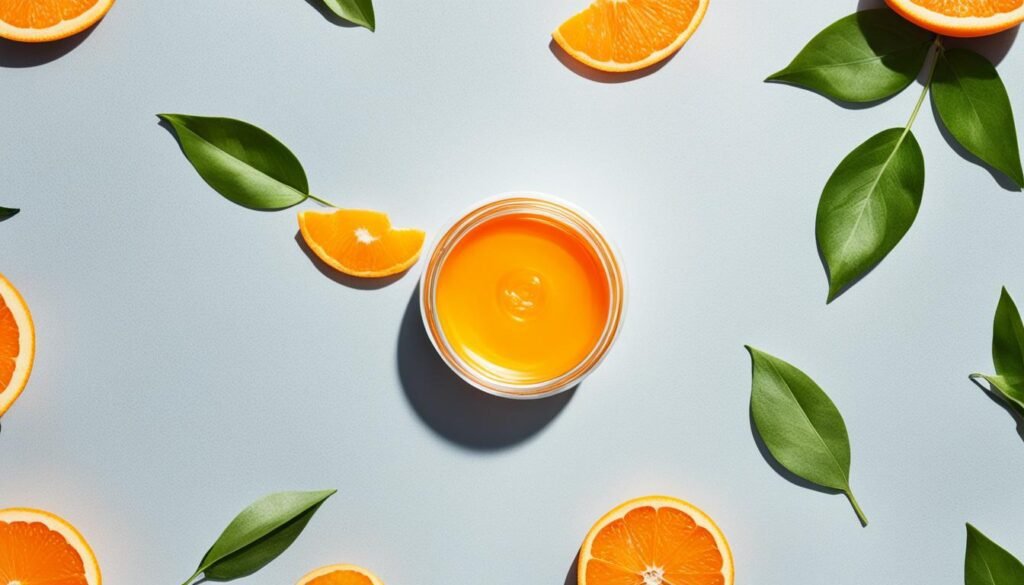
Vitamin C plays a vital role in maintaining the health and appearance of our skin. As the most common antioxidant found in the skin, it is essential for repairing free radicals and preventing them from causing damage and accelerating the aging process.
One of the main benefits of vitamin C for skin aging is its ability to prevent sun damage. UV radiation from the sun can cause oxidative stress and contribute to the breakdown of collagen, leading to the formation of wrinkles and fine lines. Vitamin C acts as a shield against this damage by neutralizing free radicals and reducing the harmful effects of UV exposure.
In addition to protecting against sun damage, vitamin C also stimulates collagen production in the skin. Collagen is a vital protein that provides structure and elasticity to the skin. As we age, collagen production naturally decreases, leading to sagging and wrinkles. By promoting collagen synthesis, vitamin C helps maintain firm and youthful-looking skin.
While vitamin C can be obtained through various dietary sources such as citrus fruits, strawberries, and bell peppers, it can also be beneficial to consider vitamin C supplements for anti-aging purposes. These supplements provide a concentrated dose of vitamin C, ensuring that your body receives the necessary amount to support skin health.
Furthermore, vitamin C can also help reduce hyperpigmentation and brighten the skin, giving it a more radiant appearance. It helps fade dark spots and evens out skin tone, leaving you with a smoother and more youthful complexion.
Given its importance in repairing and protecting the skin, vitamin C has become a popular ingredient in many skincare products. With ongoing clinical trials to develop stable and effective formulations, vitamin C-infused creams and serums are increasingly being used to combat skin aging.
Including vitamin C-rich foods in your diet, considering supplements, and incorporating skincare products with vitamin C are all effective ways to harness the benefits of this powerful antioxidant and maintain healthy, youthful-looking skin.
Vitamin C-Rich Foods
To ensure an ample supply of vitamin C for your skin, include the following foods in your diet:
- Oranges
- Strawberries
- Kiwis
- Pineapple
- Bell peppers
- Citrus fruits
- Broccoli
These vitamin C-rich foods can provide a natural source of this essential nutrient, supporting your skin’s health and contributing to its youthful appearance.
| Vitamin C Benefits for Skin Aging | Description |
|---|---|
| Enhances collagen production | Vitamin C stimulates collagen synthesis, promoting firmness and elasticity in the skin. |
| Reverses sun damage | As a powerful antioxidant, vitamin C protects the skin from harmful UV radiation and repairs sun damage. |
| Reduces wrinkles and fine lines | Vitamin C helps reduce the appearance of wrinkles and fine lines by enhancing collagen production and smoothing the skin’s texture. |
| Brightens the skin | By reducing hyperpigmentation and promoting an even skin tone, vitamin C gives the skin a radiant and youthful glow. |
The Power of Collagen for Youthful Skin
Collagen is a protein that plays a vital role in maintaining the structure of our skin. As we age, the production of collagen naturally decreases, which can lead to the formation of wrinkles and sagging skin. However, there are ways to boost collagen levels and promote youthful, radiant skin.
One popular method is through the use of collagen supplements. These supplements contain collagen peptides that are easily absorbed by the body and can help improve skin elasticity and reduce the appearance of wrinkles. Studies have shown that collagen supplementation can have a positive effect on skin hydration, roughness, and elasticity.
But how does collagen actually work to improve the skin? Collagen molecules provide a framework for the skin and help maintain its firmness and elasticity. When collagen levels decline, the skin loses its natural support structure, leading to the formation of wrinkles and fine lines.
By supplementing with collagen, you can replenish the levels of this important protein in your body, thereby improving skin elasticity and reducing the appearance of wrinkles. Collagen peptides are easily absorbed by the body and can help stimulate the production of new collagen, resulting in a more youthful complexion.
It’s important to note that while collagen supplements can be effective in improving skin health, they work best when combined with a comprehensive skincare routine that includes proper cleansing, hydration, and sun protection. Additionally, maintaining a healthy lifestyle, including a balanced diet and regular exercise, can also contribute to the overall health and appearance of your skin.
If you’re considering adding collagen supplements to your anti-aging skincare routine, it’s always a good idea to consult with a dermatologist or healthcare professional. They can help determine the best collagen supplement for your individual needs and provide guidance on how to incorporate it into your skincare regimen.
The Benefits of Collagen for Skin Aging:
- Improves skin elasticity
- Reduces the appearance of wrinkles and fine lines
- Enhances skin hydration
- Promotes a more youthful complexion
By incorporating collagen supplements into your skincare routine, you can harness the power of this essential protein to achieve youthful, radiant skin.
Vitamin A: Regulating Skin Health
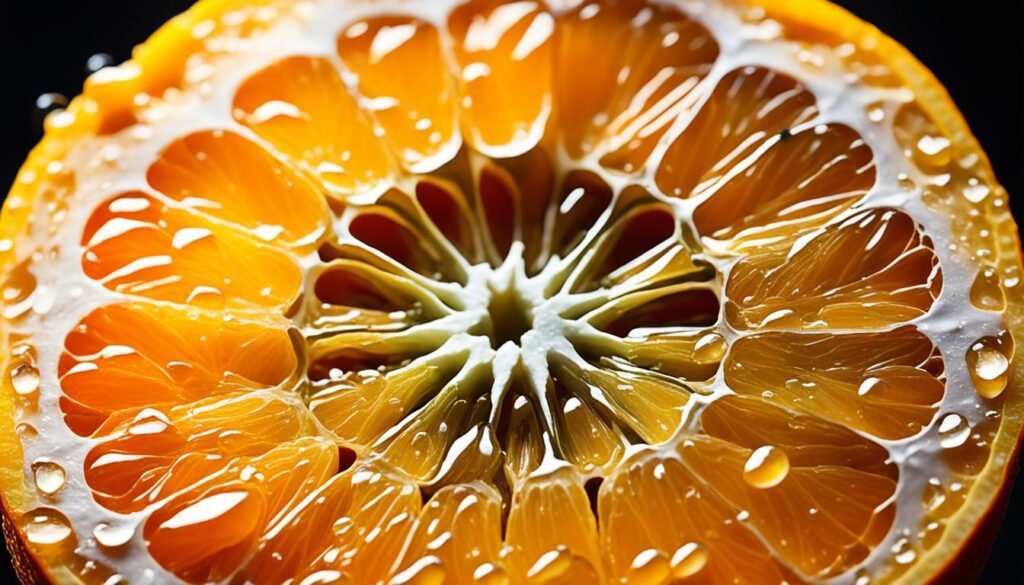
Vitamin A, also known as retinol, is a powerhouse when it comes to anti-aging. It plays a crucial role in regulating skin health, providing numerous benefits for combatting the effects of aging.
One of the key benefits of vitamin A for skin aging is its ability to boost collagen production. Collagen is a protein that maintains the structure and elasticity of the skin. As we age, collagen production naturally decreases, leading to the formation of wrinkles and fine lines. However, vitamin A helps stimulate collagen production, resulting in smoother and firmer skin.
Furthermore, vitamin A interferes with the enzymes that break down collagen in the skin. By inhibiting these enzymes, vitamin A helps preserve collagen, reducing the appearance of wrinkles and improving overall skin texture.
In addition to its role in collagen production, vitamin A offers other significant advantages for skin health. It promotes better vision, supports a stronger immune system, and plays a vital role in proper heart and lung function.
To incorporate vitamin A into your routine, you have several options. One way is to consume foods rich in vitamin A. These include carrots, sweet potatoes, spinach, kale, and liver. Alternatively, you can opt for vitamin A supplements, ensuring you meet your daily recommended intake. However, it’s crucial to consult with a healthcare professional before starting any new supplement regimen.
By including vitamin A in your diet or supplement routine, you can regulate skin health and reap the benefits of reduced wrinkles and improved overall health.
| Vitamin A-Rich Foods | Source | Amount of Vitamin A per Serving |
|---|---|---|
| Carrots | Raw, 1 medium carrot | 759 micrograms |
| Sweet Potatoes | 1 medium sweet potato, baked | 1096 micrograms |
| Spinach | Raw, 1 cup | 2813 micrograms |
| Kale | Raw, 1 cup | 10302 micrograms |
| Liver | Beef liver, cooked, 3 ounces | 6487 micrograms |
Vitamin D: Sunshine Vitamin for Skin Protection
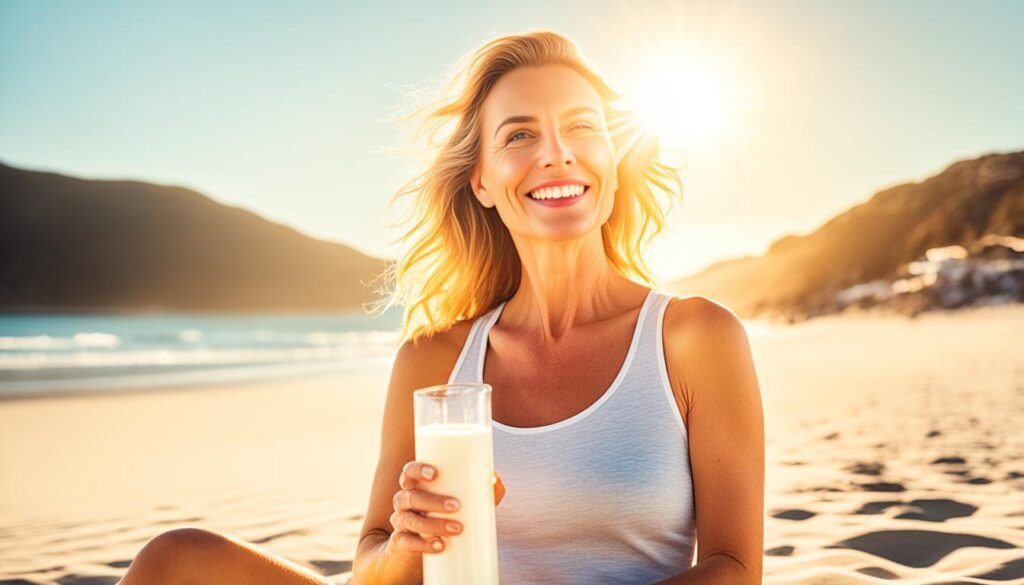
Vitamin D, known as the sunshine vitamin, is not only important for bone health but also plays a significant role in preventing premature aging. It protects the skin from ultraviolet (UV) light, a major cause of wrinkles and lines. Recent studies have shown that vitamin D has the power to extend the median lifespan.
Getting adequate sun exposure or consuming vitamin D-rich foods is essential for maintaining skin health and preventing the signs of aging.
The Benefits of Vitamin D for Skin Aging
Vitamin D offers several benefits for the aging skin:
- UV Protection: Vitamin D acts as a natural sunscreen, protecting the skin from the harmful effects of UV radiation. It helps reduce the risk of sunburn, sun damage, and the formation of wrinkles and fine lines caused by excessive sun exposure.
- Collagen Production: Vitamin D plays a role in collagen synthesis, a protein that helps maintain skin elasticity and firmness. By promoting collagen production, vitamin D helps reduce the appearance of sagging skin and improves overall skin texture.
- Anti-Inflammatory Properties: Vitamin D has anti-inflammatory properties, which can help calm and soothe irritated or inflamed skin. It can be beneficial for conditions such as eczema, psoriasis, and rosacea, which are associated with inflammation.
- Enhanced Skin Barrier Function: Vitamin D contributes to improving the skin’s natural barrier function, which helps retain moisture and prevent water loss. This results in hydrated and healthier-looking skin.
Vitamin D-Rich Foods
To increase your vitamin D intake, incorporate the following foods into your diet:
| Food Source | Vitamin D Content per Serving |
|---|---|
| Fatty Fish (Salmon, Mackerel, Sardines) | 200-600 IU |
| Egg Yolks | 40-50 IU |
| Cheese | 40-50 IU |
| Mushrooms (Exposed to UV Light) | 400-500 IU |
| Fortified Dairy Products | 100-150 IU |
Adding these vitamin D-rich foods to your meals can help ensure a sufficient intake of this essential nutrient.
Vitamin D Supplements for Anti-Aging
In addition to dietary sources, vitamin D supplements are available to support your anti-aging efforts. It is best to consult with a healthcare professional to determine the appropriate dosage and form of vitamin D supplementation based on your individual needs and health status.
The image above showcases the importance of vitamin D for skin protection and overall health.
Remember, while vitamin D is crucial for skin health, it is essential to strike a balance between sun exposure and protection to avoid harmful effects. Always practice safe sun habits, such as wearing sunscreen, protective clothing, and seeking shade during peak sun hours.
Vitamin E: The Essential Antioxidant for Overall Health
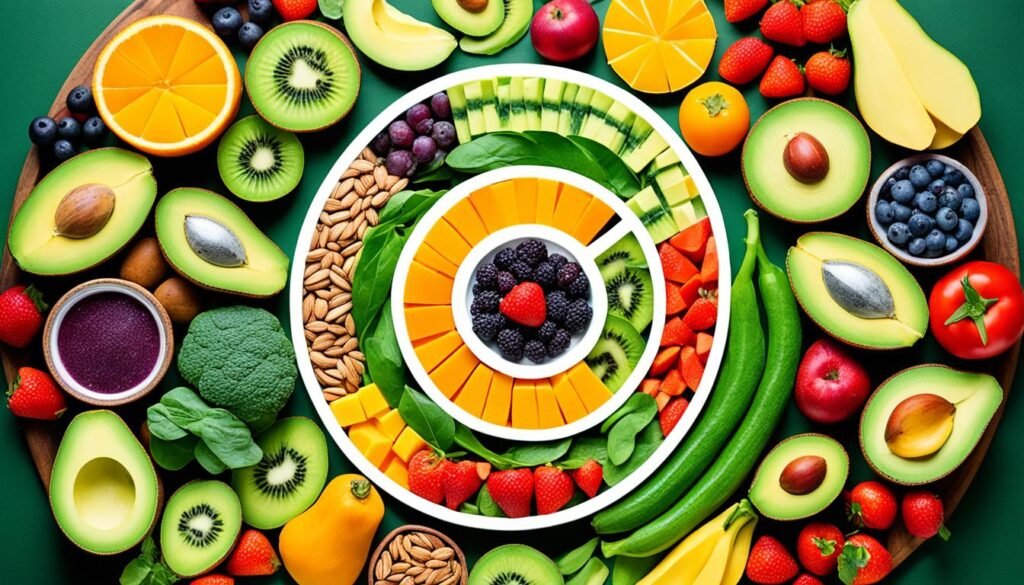
Vitamin E is an essential nutrient that offers numerous benefits for overall health. In addition to its well-known advantages for skin health, vitamin E plays a crucial role in supporting heart health and cognitive function. This powerful antioxidant helps neutralize harmful free radicals, protecting cells from damage and promoting overall well-being.
Benefits of Vitamin E for Overall Health
Vitamin E provides a range of benefits that contribute to overall health and vitality. Some key advantages include:
- Reduced risk of heart disease: Vitamin E has been linked to a lower risk of heart disease by preventing the oxidation of LDL cholesterol and reducing harmful blood clot formation.
- Protection against cognitive decline: Studies suggest that vitamin E may help protect against age-related cognitive decline and improve overall brain health.
To experience the benefits of vitamin E for overall health, it’s important to incorporate vitamin E-rich foods into your diet or consider taking vitamin E supplements.
Vitamin E-Rich Foods
Getting an adequate amount of vitamin E is easy when you include foods rich in this nutrient in your diet. Here are some vitamin E-rich foods to consider:
- Almonds
- Sunflower seeds
- Avocado
- Spinach
- Kale
By incorporating these foods into your meals and snacks, you can boost your vitamin E intake and support your overall health.
Vitamin E and Heart Health
Vitamin E has been shown to have a positive impact on heart health. Its antioxidant properties help prevent the oxidation of LDL cholesterol, which can lead to the buildup of plaque in the arteries. By reducing oxidative stress and inflammation, vitamin E may contribute to a lower risk of heart disease.
Vitamin E and Cognitive Function
Research suggests that vitamin E may play a role in maintaining cognitive function and protecting against age-related cognitive decline. As an antioxidant, vitamin E helps reduce oxidative stress in the brain and supports healthy brain aging. Including vitamin E-rich foods in your diet or taking vitamin E supplements may help support brain health and cognitive function.
Incorporating Vitamin E into Your Routine
To ensure you’re getting enough vitamin E for overall health, consider incorporating vitamin E-rich foods into your daily meals. If needed, talk to your healthcare provider about vitamin E supplementation to meet your individual needs. By prioritizing the intake of this essential antioxidant, you can support your skin, heart, brain, and overall well-being.
Other Anti-Aging Supplements to Consider
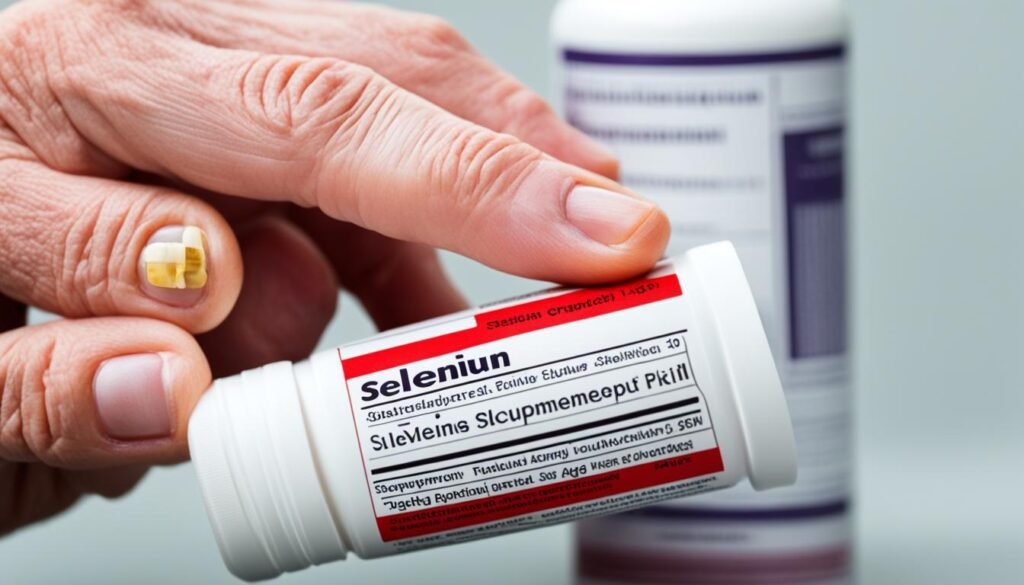
In addition to the vitamins mentioned above, there are other supplements that may support healthy aging. These supplements, along with the essential vitamins, can form a comprehensive anti-aging regimen. Let’s explore some of them:
Curcumin: Enhancing Cognition and Memory
Curcumin, found in turmeric, has been found to improve cognition and memory. Its antioxidant and anti-inflammatory properties help protect the brain from age-related cognitive decline. Studies have shown that curcumin may help improve memory, attention, mood, and overall brain function in older adults.
Resveratrol: Protecting the Skin and Extending Lifespan
Resveratrol, found in grapes and berries, is known for its potential anti-aging effects. This powerful antioxidant protects the skin from the harmful effects of UV radiation, reducing the risk of premature aging. Furthermore, resveratrol has been shown to activate longevity genes and increase lifespan in various organisms, making it a promising supplement for healthy aging.
Zinc: Supporting Immune Function and Hair Health
Zinc is an essential mineral that plays a vital role in immune function and hair health. It supports the production of immune cells that fight against infections and helps maintain the health of the scalp and hair follicles. Incorporating zinc-rich foods or supplements into your diet can help promote overall well-being and hair growth.
Selenium: Promoting Longevity and Reducing Age-Related Diseases
Selenium is a trace mineral that has been associated with various health benefits, including promoting longevity and reducing the risk of age-related diseases. Research suggests that selenium may have anti-aging effects by protecting DNA, enhancing immune function, and reducing inflammation. Consuming selenium-rich foods or taking selenium supplements can be beneficial for healthy aging.
Consider incorporating these other anti-aging supplements into your routine to support healthy aging and maintain a youthful appearance.
| Supplement | Benefits |
|---|---|
| Curcumin | Enhanced cognition and memory |
| Resveratrol | Skin protection and potential lifespan extension |
| Zinc | Support for immune function and hair health |
| Selenium | Promotion of longevity and reduction of age-related diseases |
Conclusion
Taking effective vitamins and supplements is essential in the fight against skin aging. The role of antioxidants, including selenium, vitamin E, and vitamin C, cannot be overstated when it comes to protecting and repairing the skin. These antioxidants combat free radicals and minimize the harmful effects of sun exposure, pollution, and other environmental stressors.
To achieve a comprehensive anti-aging regimen, it is crucial to incorporate other beneficial supplements as well. Collagen is key to maintaining skin elasticity, while vitamins A and D contribute to overall skin health and protection. A well-rounded approach, including a balance of vitamins, supplements, and a healthy lifestyle, is vital for youthful skin and overall well-being.
By incorporating these effective vitamins and supplements into your skincare routine, you can support your skin’s natural rejuvenation process, reduce the appearance of wrinkles, and achieve a more radiant complexion. Remember, consistency is key, so make sure to stick to your comprehensive anti-aging regimen for lasting results. Keep in mind that individual results may vary, and it is always advisable to consult with a healthcare professional before starting any new supplement regimen.
FAQ
Are there vitamins that are effective in reducing skin aging?
Yes, there are several vitamins that have been proven to be effective in reducing skin aging. These include selenium, vitamin E, vitamin C, vitamin A, and vitamin D, among others.
How do antioxidants play a role in preventing skin aging?
Antioxidants neutralize free radicals, which are unstable molecules that can damage cells and contribute to the aging process. By neutralizing these free radicals, antioxidants can help prevent and reduce skin aging.
What are the benefits of selenium for skin health?
Selenium helps protect the skin from sun damage, preserves tissue elasticity, and slows down the aging process of tissues. It can be found in whole grain cereals, seafood, garlic, and eggs.
How does vitamin E protect the skin and prevent damage?
Vitamin E protects cell membranes and prevents damage to enzymes associated with them. It has been shown to reduce damage caused by sun exposure, limit the production of cancer-causing cells, and improve skin texture. Vitamin E can be found in vegetable oils, grains, oats, nuts, and dairy products.
What role does vitamin C play in repairing and protecting the skin?
Vitamin C is essential for repairing free radicals and preventing them from becoming cancerous or accelerating the aging process. It helps in the production of collagen and is more susceptible to environmental stressors. Vitamin C can decrease significantly with minimal UV exposure and exposure to city pollution.
How does collagen supplementation benefit the skin?
Collagen supplementation improves skin elasticity and reduces wrinkles. It has positive effects on skin hydration, roughness, and elasticity. Collagen is considered an important anti-aging supplement.
What is the role of vitamin A in regulating skin health?
Vitamin A boosts collagen production, reduces wrinkles, and interferes with the enzymes that break down collagen in the skin. It also promotes better vision, a stronger immune system, and proper heart and lung function.
How does vitamin D protect the skin and prevent premature aging?
Vitamin D protects the skin from UV light, a major cause of wrinkles and lines. It plays a significant role in preventing premature aging and can be obtained through sun exposure or consuming vitamin D-rich foods.
What are the overall health benefits of vitamin E?
Vitamin E reduces the risk of heart disease, protects against cognitive decline, and acts as a powerful antioxidant that neutralizes free radicals and protects cells from damage.
Are there any other supplements that support healthy aging?
Yes, there are other supplements such as curcumin, resveratrol, zinc, and selenium that may support healthy aging. These supplements have various benefits ranging from improved cognition, skin protection, immune function, and hair health.
What is the importance of taking vitamins and supplements for skin aging?
Taking effective vitamins and supplements is an important step in combating the effects of skin aging. They provide essential nutrients and antioxidants that can protect and repair the skin, improve collagen production, and maintain overall health.

